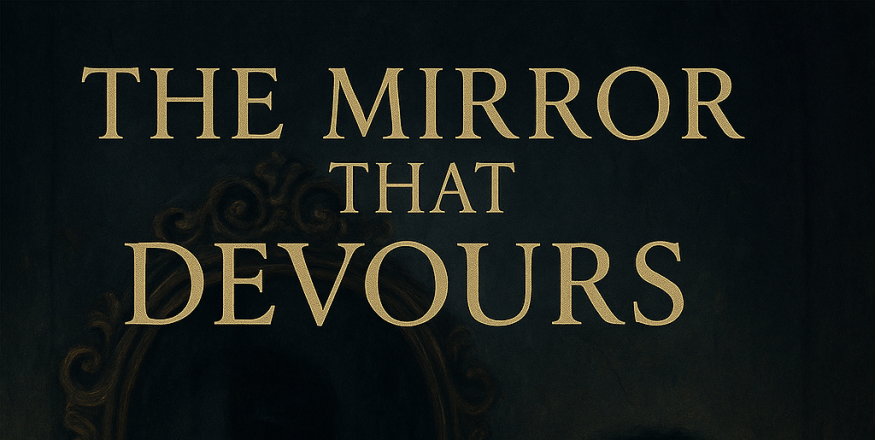The attic called to me.
Not in sound, not in word—but in silence. A pressure behind the breastbone, like the breath you don’t know you’re holding. I had walked past the narrow stairwell a dozen times before acknowledging it. Each time, the cark in the wall beside it seemed deeper, more pronounced—as if the house itself was shifting around it, nudging it closer to my notice.
The staircase was narrow and steep, nearly hidden behind a warped door at the end of the east wing corridor. That hallway always felt wrong. Too quiet. The shadows pooled there, lingering long after the sun had passed, and the scent of mildew was stronger—as though the house itself rotted inward from that point.
Madame Morvane had paused there once, basket of firewood in her arms, and said in a voice dry as leaves,186Please respect copyright.PENANAbVwNBzlS4D
“Some doors are best left shut, Miss Elysia.”
She never said which ones. I never asked.
But curiosity is a quiet hunger. It feeds on silence. And this house gave me silence in abundance.
The door creaked open like a sigh. The air beyond was colder than it should have been—stale, dry, tinged with something coppery. The steps groaned beneath my weight, as though protesting my intrusion. Dust danced in the beam of my candle like ashes suspended in water. The walls narrowed the higher I climbed, until it felt less like a staircase and more like a throat swallowing me whole.
The attic was a cathedral of forgotten things.
Furniture slouched beneath moth-eaten sheets, strange shapes warped by time. The window slats cast slivers of pale light that barely touched the far corners, where shadows moved a little too easily. Cobwebs clung like veils. The air smelled of lavender long dead and something faintly sour, like wet stone left to decay.
And beneath it all, something... listening.
I felt it. That slow awareness you get when someone stares at you from across a room. Only there was no one there. Just the soft creak of the rafters and the hush of wind sliding over the roof. And yet I had the distinct feeling I was no longer alone.
I turned toward the back wall. There, tucked behind an armoire, was a sliver of uneven paneling. Subtle, but wrong. The boards were newer, smoother, as though replaced in recent years—though no one had lived here in decades. My fingers brushed the seam. Cold. Too cold.
It gave way with a soft click.
A narrow crawlspace yawned before me, the air colder still, thick with the scent of dust and something older. Older than wood. Older than memory.
I crawled in.
At the end, hidden as if deliberately entombed, was a mirror.
Tall. Arched like the windows of a ruined church. The frame was carved with twisted vines and shapes I didn’t recognize—symbols half-erased by time, but they unsettled me. My skin prickled before I even uncovered it.
The sheet was brittle and yellowed with age. My hand trembled as I pulled it free.
The glass was... wrong.
Not the reflective silver of ordinary mirrors, but dark—like oil over water, or black mercury. It did not show the room. It barely showed me. My shape was there, but shadowed, as though the mirror was remembering a version of me long dead.
I raised a hand.
The reflection did not follow.
For a breathless moment, I thought I saw something behind the glass—something tall and thin, draped in shadow, watching.
Then it was gone. Or perhaps it had never been.
The surface was warm beneath my fingers. Too warm.
A flicker danced behind my eyes—a pulse of light like the aftershock of lightning. Not pain. Not vision. Just a... presence.
I stepped back, pulse quickening. My mouth was dry.
I didn’t tell Madame Morvane.
I didn’t move the mirror.
I left it there in the attic, untouched and unspoken of. But I felt it, even after I returned to my room. I felt it like a second heartbeat, one I couldn’t silence.
That night, I dreamed.
Not of Victor. Not of the accident. Not even of the screams that had chased me through a sea of burning canvas and bitter smoke.
I dreamed of the lake.
Black as obsidian. Still, and endless. The sky above it was starless. Moonless. The world had been drained of light.
He stood at the water’s edge.
Not facing me, but present—like a memory buried too deep to dislodge. His coat billowed behind him like smoke. I called out to him. Not Victor. Him. Though I did not yet know his name.
The surface of the lake rippled.
From beneath, something rose. A figure made of shadow, dripping with paint, gliding across the water’s surface without a ripple.
He turned. His face was half-formed—eyeless, featureless, yet aching with sorrow. And when he opened his mouth, he did not speak.
The mirror spoke for him.
“Paint me.”
The voice slid into my bones, into my lungs, and filled the hollow places I thought I’d buried.
“Bring me to light.”
And then:186Please respect copyright.PENANA9dVX6DPlDo
“Make me real.”
I woke with a start.
Cold sweat clung to my neck. My hands trembled. The fire had died down to embers, yet my candle—burned all the way to its base—still flickered faintly.
And I was standing.
In front of my easel.
Brush in hand.
The canvas was blank, but I could see him already.
Waiting.
ns216.73.216.82da2

































